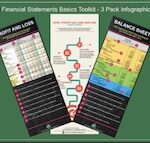Hotel Budgeting and Forecasting - Ultimate Guide
Are you having difficulty understanding the process of hotel budgeting and forecasting?
Not to worry!
This Ultimate Guide provides basics of why, what, when, where and how of a hotel budget.
It answers the following key questions on a hotel budgeting and forecasting exercise:
This Ultimate Guide is divided into the following chapters while answering the above questions:
How to Use This Ultimate Guide Effectively
You will get the most out of this guide if you follow the below steps to learning hotel budgeting and forecasting.
Spend some time studying the Paradise Hotel Income Statement which the guide begins with in Chapter 1 Below:
Grab this EXCEL Spreadsheet
Don’t miss our 5 Killer Hotel KPIs Dashboard
Get this exclusive Excel Template that you can customize to create your own 5 Killer Hotel KPIs Dashboard
- Take Notes on what you do not understand [you can ask questions in the comments section below the post]
- Understand the concept of Current Month, Year To Date, Budget, Actual and Variance explained below.
- Current Month is “1”, Year To Date is “2”, Actual is "3", Budget is "4", and Variance is "5" in the Paradise Hotel Income Statement Infographic below.
- Look them up right now.
- Go on! I will wait.
Types of Budget in the Hotel Industry
As a business enterprise, every hotel prepares a business plan.
The plan broadly lays out the targets and goals to be achieved by the hotel in a forthcoming year.
In other words, a budget for a hotel business plan is an aspirational goal.
A hotel budget can take various forms like:
- Operation Budget
- Capital Budget
- Cash Budget
and so on.
The Operation Budget is one of the most common types of budget.
It lays down the targets for a forthcoming year relating to:
- revenue
- expenses
- profit
This Ultimate Guide on Hotel Budgeting and Forecasting will be predominantly about the operation budget.
However, a chapter is also devoted to the capital budget as it is closely related to the operation budget.
Before one understands the process of budgeting it is critical to be familiar with a few terms.
Take a look at the infographic below:
Important Elements and Concepts of a Budget
There are five important elements or concepts to a budget you must understand.
- Current Month revenue, expenses and profit and
- Year To Date revenue, expenses and profit i.e., for the actual number of months completed in the current year
Current month results only reflect the performance of the hotel for the particular month.
They can thus can be analyzed in isolation.
The Year To Date number requires a bit of explanation.
As an example, the year to date calculation is:
- you take the year to date at the end of January 2020 and
- add the current month of February 2020 to it
- to get the year to date of February 2020.
In Chapter 2, you will learn why it is important to separate current month and year to date figures for revenue, expenses and profit?
Apart from the above two period elements, it is important to distinguish between the following four numbers:
- Actuals - these are the results for the period based on a month's profit and loss statement
- Budget - these are the monthly targets for revenue, expenses and profit
- Variance - this is the difference between actuals and budget; variances can be positive or negative.
- Last Year - these are the results for the period in the previous year based on the profit and loss statement.
Take a look below:
As you can see from the Paradise Hotel Income Statement, these four numbers can be for current month or year to date.
We have now understood what a budget is and some key concepts related to that.
It is time to get into the why of a hotel budgeting exercise which we will see in Chapter 1.
Chapter 1 - What is the Purpose of Budgeting and Forecasting?
Why budget?
This may be a question that many new hotel managers may be asking themselves.
Consider that every business enterprise owner must be pursuing some goals in their investment.
Otherwise, why would they be pouring in millions of dollars in their hotel project?
How would they know if they are getting an adequate return for their investment?
Well, they would do that by measuring business results.
In other words, a performance measurement system must be in place for that.
The hotel budget is the foundation of such a performance measurement system.
Click below to understand in depth what is the purpose of a hotel budget?
Chapter 2 - How is Revenue Budgeting Done?
In the hospitality industry there is an age old saying:
"If you do not have a top line, you will not have a bottom line."
So, what are top and bottom lines?
In Chapter 1 we talked about the purpose of a hotel budget.
In any performance measurement system, the first priority is revenue generation.
Or in other words the Top Line.
So, you could say that a Hotel Revenue Budget lays out how a hotel will earn its revenue.
Click below to learn how a hotel budget covers the different sources of revenue generation.
Hotel Budgeting Basics Beginners Struggle With – Revenue KPIs
Chapter 3 - How is Expenses Budgeting Done?
it is a basic principle of business that revenue cannot be generated on its own.
A hotel needs to incur expenses to earn revenue.
The critical factor is that revenue and expenses have a close relationship.
An effective hotel budget leverages this relationship.
Expenses can broadly be called the cost of doing business.
Click below to understand in depth about this cost of doing business - expenses.
Hotel Budgeting Basics Beginners Struggle With – Expense KPIs
Chapter 4 - Is Profitability Budgeted For?
An intriguing question that comes up often is whether profitability can also be budgeted.
This question comes up because of the formula below:
Revenue minus Expenses = Profit
If profit is the result of deducting expenses from revenue, why should it then be budgeted separately?
Great question.
The reason is that both revenue and expenses may be impacted by different factors.
It is thus important to set a target for profitability separately.
So, that measurement can be made of all the factors that impact revenue and expenses.
In the absence of a profitability budget, you would not know what is causing a drop (or rise also) in profit.
Moreover, profitability comes in different flavors.
It is critical to be clear which flavors are being targeted in the budget.
Click below to learn how a hotel profitability is budgeted for.
Hotel Budgeting Basics Beginners Struggle With – Profitability KPIs)
Chapter 5 - How are Budget Deficits Handled?
We have thus far understood how a hotel budgets for revenue, expenses and profitability.
However, an important question needs to be addressed at this point.
How does the hotel know if it is doing well or not so well?
In other words, what is the status of the performance measurement process?
That is where a hotel budget proves invaluable.
More specifically the variance element in an income statement.
Refer to "5" in the Paradise Hotel Income Statement Infographic above.
A variance shows how much actuals deviate from the budget.
The deviation can be positive or negative.
Negative variances are called deficits.
Deficits for revenue and expenses are computed differently.
Click below to understand how variances and more specifically deficits are handled in budgets.
Chapter 6 - What is the difference between budgeting and forecasting?
In the past five chapters of this Ultimate Guide on Hotel Budgeting and Forecasting, we have only discussed budgeting.
So, what is the difference between budgeting and forecasting?
To understand the difference we must identify the relationship between the two.
Broadly speaking, a hotel budget is an annual exercise.
On the other hand, a hotel forecast is a monthly exercise.
More importantly, the forecast is a monthly adjustment of the budget.
What adjustment is this you ask?
And what is it based on you want to know?
Great questions.
Click below to discover how a hotel forecast makes corrections to the budget.
Chapter 7 - Capital Expenditure Budget for Hotels
Chapters 1 to 6 earlier mainly dealt with the hotel operations budget.
This involved itself with:
- earning revenue,
- incurring expenses and
- retaining profit.
However, we need to know how a hotel will be able to generate revenue.
A hotel generates revenue using assets.
Assets can also be called the source of revenue generation.
Earlier, we looked at how a hotel budget would be able to plan out revenue, expenses and profit.
Think about it in the same vein.
You also need to plan out the assets which would produce the budget revenue.
And that type of budget is called a Capital Budget.
Click below to learn how capital budgeting lays the foundation for the hotel operation budget to be effective.
So, there you are.
The Ultimate Guide on Hotel Budgeting and Forecasting.
Coming...
Sign up to Speed Tips - Learn in Minutes for more tips, strategies and secrets straight to your inbox.
14







